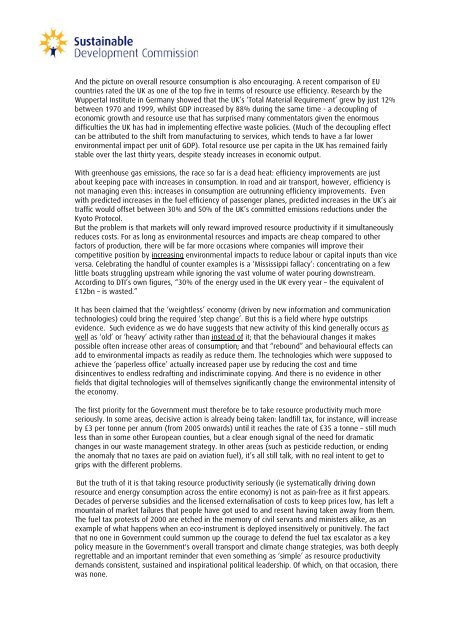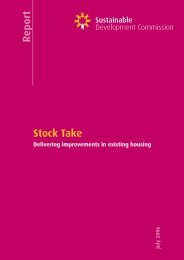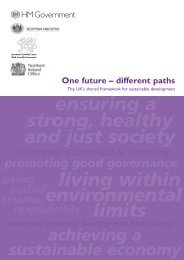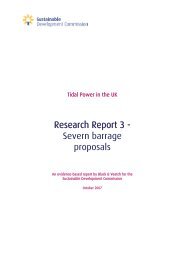Redefining prosperity, resource productivity, economic growth
Redefining prosperity, resource productivity, economic growth
Redefining prosperity, resource productivity, economic growth
Create successful ePaper yourself
Turn your PDF publications into a flip-book with our unique Google optimized e-Paper software.
And the picture on overall <strong>resource</strong> consumption is also encouraging. A recent comparison of EUcountries rated the UK as one of the top five in terms of <strong>resource</strong> use efficiency. Research by theWuppertal Institute in Germany showed that the UK’s ‘Total Material Requirement’ grew by just 12%between 1970 and 1999, whilst GDP increased by 88% during the same time - a decoupling of<strong>economic</strong> <strong>growth</strong> and <strong>resource</strong> use that has surprised many commentators given the enormousdifficulties the UK has had in implementing effective waste policies. (Much of the decoupling effectcan be attributed to the shift from manufacturing to services, which tends to have a far lowerenvironmental impact per unit of GDP). Total <strong>resource</strong> use per capita in the UK has remained fairlystable over the last thirty years, despite steady increases in <strong>economic</strong> output.With greenhouse gas emissions, the race so far is a dead heat: efficiency improvements are justabout keeping pace with increases in consumption. In road and air transport, however, efficiency isnot managing even this: increases in consumption are outrunning efficiency improvements. Evenwith predicted increases in the fuel efficiency of passenger planes, predicted increases in the UK’s airtraffic would offset between 30% and 50% of the UK’s committed emissions reductions under theKyoto Protocol.But the problem is that markets will only reward improved <strong>resource</strong> <strong>productivity</strong> if it simultaneouslyreduces costs. For as long as environmental <strong>resource</strong>s and impacts are cheap compared to otherfactors of production, there will be far more occasions where companies will improve theircompetitive position by increasing environmental impacts to reduce labour or capital inputs than viceversa. Celebrating the handful of counter examples is a ‘Mississippi fallacy’: concentrating on a fewlittle boats struggling upstream while ignoring the vast volume of water pouring downstream.According to DTI’s own figures, “30% of the energy used in the UK every year – the equivalent of£12bn – is wasted.”It has been claimed that the ‘weightless’ economy (driven by new information and communicationtechnologies) could bring the required ‘step change’. But this is a field where hype outstripsevidence. Such evidence as we do have suggests that new activity of this kind generally occurs aswell as ‘old’ or ‘heavy’ activity rather than instead of it; that the behavioural changes it makespossible often increase other areas of consumption; and that “rebound” and behavioural effects canadd to environmental impacts as readily as reduce them. The technologies which were supposed toachieve the ‘paperless office’ actually increased paper use by reducing the cost and timedisincentives to endless redrafting and indiscriminate copying. And there is no evidence in otherfields that digital technologies will of themselves significantly change the environmental intensity ofthe economy.The first priority for the Government must therefore be to take <strong>resource</strong> <strong>productivity</strong> much moreseriously. In some areas, decisive action is already being taken: landfill tax, for instance, will increaseby £3 per tonne per annum (from 2005 onwards) until it reaches the rate of £35 a tonne – still muchless than in some other European counties, but a clear enough signal of the need for dramaticchanges in our waste management strategy. In other areas (such as pesticide reduction, or endingthe anomaly that no taxes are paid on aviation fuel), it’s all still talk, with no real intent to get togrips with the different problems.But the truth of it is that taking <strong>resource</strong> <strong>productivity</strong> seriously (ie systematically driving down<strong>resource</strong> and energy consumption across the entire economy) is not as pain-free as it first appears.Decades of perverse subsidies and the licensed externalisation of costs to keep prices low, has left amountain of market failures that people have got used to and resent having taken away from them.The fuel tax protests of 2000 are etched in the memory of civil servants and ministers alike, as anexample of what happens when an eco-instrument is deployed insensitively or punitively. The factthat no one in Government could summon up the courage to defend the fuel tax escalator as a keypolicy measure in the Government's overall transport and climate change strategies, was both deeplyregrettable and an important reminder that even something as ‘simple’ as <strong>resource</strong> <strong>productivity</strong>demands consistent, sustained and inspirational political leadership. Of which, on that occasion, therewas none.








